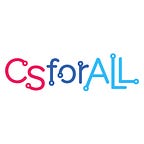Betting On Black Girl Magic
Written by Tarika Barrett, PhD, VP of Programs at Girls Who Code
When astronaut Mae Jemison boarded the Space Shuttle Endeavour to become the first black woman to travel in space on September 12, 1992 — she took with her a poster of black dancer and Alvin Ailey artistic director Judith Jamison performing the dance “Cry.” She also took a flag for the Alpha Kappa Alpha sorority — the oldest black sorority in the United States.
Today, we might say Jemison was celebrating #BlackGirlMagic. Ever since blogger CaShawn Thompson coined the phrase in 2013, we’ve used it to elevate the beauty, strength, and resilience of black women. And we should. We use it to celebrate our progress, power, and potential. And we should. We say #BlackGirlMagic, and we feel proud. And we should. Black girls are magic.
But we also embrace the phrase — and its narrative of unwavering resilience — as the key to our collective progress… even as that progress continues to elude us.
It’s been 26 years since Jemison and her symbolic mementos made that historic journey into space, and there are still too few women — too few black women — in STEM.
Fewer than 3 percent of black women choose to pursue computer science or related fields in college. Black women receive just 0.2 percent of all venture capital dollars. And minority women comprise fewer than 10 percent of employed scientists and engineers.
So, though we wish it were, our resilience — however powerful, however profound — is not enough to shift the realities facing women of color — not on its own.
We need a movement to back our magic, a movement that realizes and celebrates the unique power of black women in the same way we do ourselves. We need the combined and sustained efforts of our allies in grassroots organizations, industry, and government in order to achieve true gender and racial equality. We need others to step up.
At Girls Who Code, we’ve been fortunate to see what happens when they do. We have over 75 corporate partners committed to hiring more women, and specifically more women of color — many have hired our college-aged alumni as interns. We are working with lawmakers to increase computer science classroom diversity. And we have had 7,000 grassroots volunteer facilitators — committed to expanding access to tech — run Girls Who Code clubs in libraries, classrooms, and community centers across the country.
It’s been six years since Girls Who Code started working to close the gender gap in tech and we are — together with these partners — making a difference.
Our black alumni are choosing to major in CS or related fields at a rate 16 times higher than the national average. Girls from historically under-represented groups in tech make up half of all Girls Who Code classrooms. And these girls are solving real problems in their communities — they’ve created websites and apps to help students find scholarships, raise awareness about cancer, and encourage positive conversations about mental health diversity.
Award-winning director, producer, and screenwriter Ava DuVernay said in 2016 that, “Black Girl Magic is a rallying call of recognition. Embedded in the everyday is a magnificence that is so easy to miss because we’re so mired in the struggle and what society says we are.”
Girls Who Code is just one movement, one industry, one part of the fight against inequality. Imagine what might happen if more movements, more industries, and more people heard this rallying call, if they realized the power of black women. Imagine the problems we could solve, the wrongs we could right, and the communities we could empower.
It’s on everyone to step up. It’s on the private sector to commit to recruiting and retaining more women of color. It’s on those in public service to commit to passing policies that empower women of color. And it’s on grassroots movements to include women of color, and to recognize the distinct challenges we face.
As we close this Black History Month, and look toward the next one, we must remember that together, we can use black girl magic to truly change black girl realities. We can create a world where powerful black girls grow up to be powerful black women — black women who, like Mae Jemison and Judith Jamison and the women of Alpha Kappa Alpha might make history in space, but don’t need to leave earth to be seen and celebrated.
Tarika Barrett currently serves as VP of Programs at Girls Who Code, a national non-profit organization working to close the gender gap in technology by inspiring, educating and equipping young women with the computing skills to pursue 21st century opportunities. In her role as VP of Programs, Tarika oversees the organization’s free Summer Immersion Program and after-school Clubs Program, which will have reached 50,000 girls across the country by spring 2018.
CSforALL is excited to welcome guest posts from the CSforALL community. Guest posts are those of the author(s) and do not necessarily reflect the views of CSforALL.
